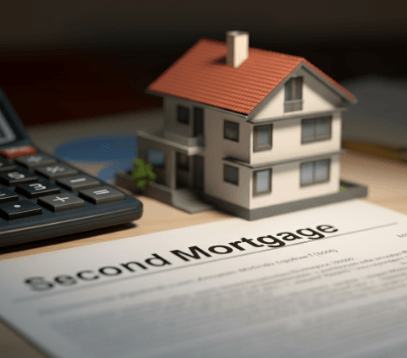Navigating the world of home financing can be daunting, especially when it involves terms like “second mortgage.” Understanding the intricacies of secondary loans is crucial for homeowners looking to tap into their home equity for various financial needs. In this comprehensive guide, we examine the question, “How do second mortgages work?” to shed light on their mechanics, benefits, and potential drawbacks. So, let’s delve into “How do second mortgages work” and discover how they could be a viable option for you.
Real estate investors like Steve Daria and Joleigh often utilize second mortgages as a strategic tool to expand their property portfolios. They can secure additional funds for new investments or property improvements by tapping into their home equity. Understanding how second mortgages work can help investors like Steve and Joleigh make informed financial decisions that align with their long-term goals.
What is a Second Mortgage?
Before answering the question, “How do second mortgages work?” it’s essential to understand that a second mortgage functions as a supplementary loan secured against the equity of a house that has an existing primary mortgage.
Homeowners can access this equity to obtain funds for various purposes, leveraging the value they’ve accumulated in their homes over time.

Unlike primary mortgages, which are used solely for purchasing a property, second mortgages are versatile and can be used for a variety of financial objectives, including home renovations, consolidating high-interest debts, funding education expenses, or making investments.
Types of Second Mortgages
There are two main types:
- House Equity Loans: These provide a lump sum amount based on the equity in your home, with fixed interest rates and repayment terms.
- Home Equity Lines of Credit (HELOCs): These function more like credit cards, allowing you to borrow up to a certain limit and pay interest only on the amount borrowed.
Benefits of Second Mortgages
Second mortgages offer several advantages, making them an attractive option for various financial needs.
Access to Significant Funds
One of the primary benefits of second mortgages is the ability to access a large amount of money based on your home equity.
This can be particularly useful for major expenses or investments.
Lower Interest Rates
Unlike personal loans or credit cards, second mortgages often come with lower interest rates, as they are secured by your property.
This can make them a cost-effective borrowing choice.
Tax Benefits
In some cases, the interest paid on second mortgages may be tax-deductible, providing additional financial benefits.
However, it’s good to consult with a tax professional to understand the specific deductions available.
Get An Offer Today, Sell In A Matter Of Days…
How Do Second Mortgages Work?
To fully grasp how do second mortgages work, it’s important to understand the application process, repayment terms, and potential risks involved.
Application Process
Applying for a second mortgage involves several steps:
- Assess Your Equity: Determine the equity in your home by subtracting your current mortgage balance from your property’s current market value.
- Choose a Lender: Research and compare lenders to find the best terms and interest rates.
- Submit Application: Provide necessary documentation, including proof of income, credit history, and property details.
Repayment Terms
Second mortgages typically have repayment terms ranging from 5 to 30 years, based on the type of loan and lender.
Home equity loans typically have fixed monthly settlements, while HELOCs offer flexible repayment options based on the amount borrowed.
Potential Risks
While second mortgages can be beneficial, they also come with risks.
Defaulting on a second mortgage can prompt foreclosure, as the loan is secured by your property.
Additionally, taking on too much debt can strain your finances, so it’s essential to borrow responsibly.
Strategies for Using Second Mortgages
Effective techniques can help you maximize the benefits of second mortgages while minimizing potential risks.
Investing in Property
Real estate investors often use second mortgages to finance additional property purchases.
By increasing the equity in their existing properties, they can expand their portfolios without depleting their savings.
Home Improvements
Using a second mortgage to fund home improvements can increase the value of your property, providing a return on investment when you sell.
Focus on renovations that give the highest return, such as kitchen upgrades, bathroom remodels, and energy-efficient improvements.

Debt Consolidation
Consolidating high-interest debts with a second mortgage can simplify your finances and decrease your overall interest costs.
This strategy can be effective if you have few credit cards or personal loans with high interest rates.
Frequently Asked Questions
To further clarify how second mortgages work, here are answers to some common questions.
Can I Avail a Second Mortgage with Bad Credit?
Getting a second mortgage is feasible, although it typically comes with challenges.
Some lenders specialize in giving second mortgages to people with lower credit scores, but they usually compensate for the higher risk by putting higher interest rates and imposing stricter terms.
To improve your chances, consider working on improving your credit score, reducing existing debts, and demonstrating stable income to strengthen your application for a second one.
How Much Can I Borrow with a Second Mortgage?
When determining how much you can borrow with a second mortgage, it’s essential to consider several factors.
Firstly, your home’s equity plays a crucial role, as lenders generally allow borrowing up to 85% of its appraised value.
Secondly, the type of second mortgage you choose—whether it is a home equity loan or a home equity line of credit (HELOC)—will influence the maximum amount available.
Lastly, each lender sets its own policies regarding second mortgages, including criteria such as credit score, income, and debt-to-income ratio, which also impact the final borrowing limit.
What Happens If I Sell My Home with a Second Mortgage?
When you sell a property with a second mortgage, the proceeds from the sale must first be used to pay off both the primary and second mortgages.
Any remaining funds can then be kept or used as desired.
Conclusion
Understanding how do second mortgages work can provide valuable opportunities for real estate investors, property sellers, and home buyers. By leveraging the equity in your home, you can access significant funds for various financial needs, from investing in property to consolidating debt. However, it’s crucial to approach second mortgages with caution, ensuring you borrow responsibly and consider potential risks.
**NOTICE: Please note that the content presented in this post is intended solely for informational and educational purposes. It should not be construed as legal or financial advice or relied upon as a replacement for consultation with a qualified attorney or CPA. For specific guidance on legal or financial matters, readers are encouraged to seek professional assistance from an attorney, CPA, or other appropriate professional regarding the subject matter.

